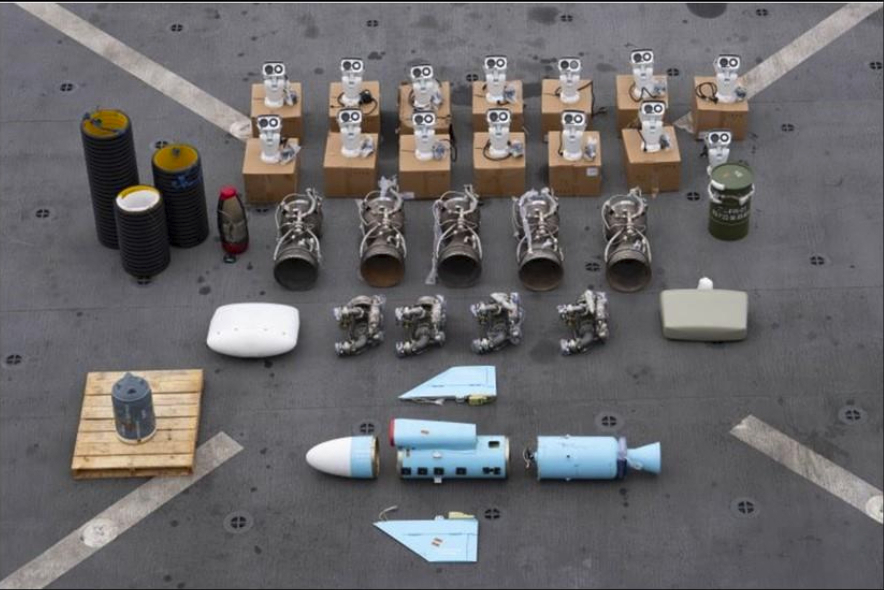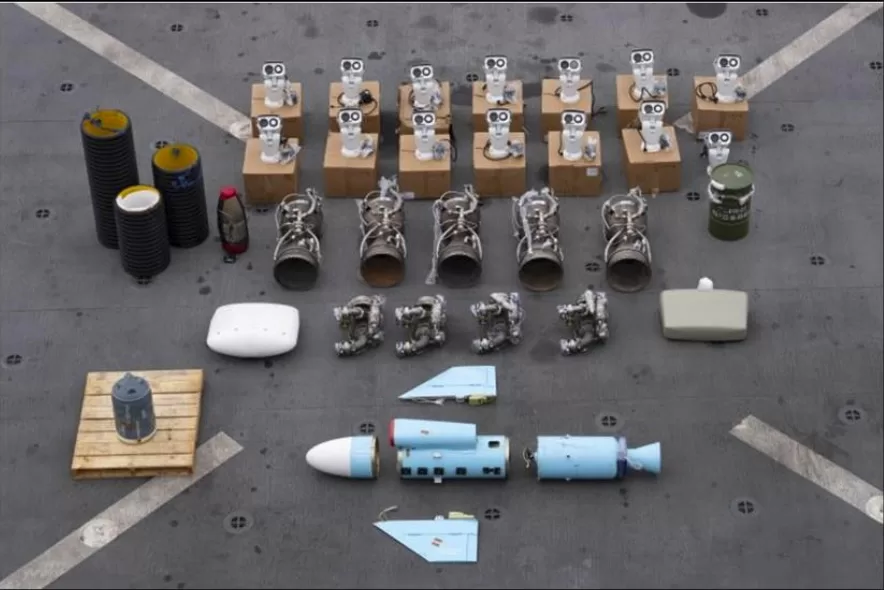
The developments come days after President Joe Biden acknowledged that U.S.-led strikes against the group
have failed to stop attacks from the militants on commercial shipping, while also vowing to continue hitting sites in Yemen to sap the Houthis’ capabilities and break their will.
Navy SEALs
intercepted one weapons shipment bound for the Houthis this month in a daring nighttime raid, seizing a small boat carrying Iranian-made cruise and ballistic missile components. The mission came at a high cost: two Navy SEALs went missing while attempting to board the boat. The military called off its search for them on Sunday.
Iran has long supported the Houthis — one of a network of proxy groups across the Middle East, along with Hamas and Lebanese Hezbollah — with weapons, training and funding. Fresh weapons from Iran could replace the ones the Houthis have lost in the half-dozen rounds of U.S. and allied strikes since they began on Jan. 11.
The shipments are a sign that Tehran is playing a direct role in fueling the crisis in the Red Sea, according to the U.S. official and a DOD official. They, along with others, were granted anonymity to discuss a sensitive national security issue.
The Central Intelligence Agency declined to comment.
The Houthis have framed their attacks on international shipping as a show of support for Gaza and as a way to pressure Israel to stop its bombing campaign targeting Hamas militants.
Additional attacks by the Houthis threaten to draw the U.S. even deeper into the widening Middle East conflict — something Biden has actively tried to avoid during his time in office. Biden has said the U.S. and Iran, which has long engaged in a shadow war with Israel, do not want to
directly fight each other. But more Houthi strikes, especially possible attacks on Western troops, would also bring Washington and Tehran closer to a direct conflict.
Some experts believe Iran’s weapons shipments and its broader support for the Houthis is an attempt to exploit the current regional turmoil to evict U.S. troops from the Middle East.
“In addition to escalating against America in Iraq and Syria via militia groups to put pressure on America to end Israel’s war against Hamas, Iran also has a more localized logic at play,” said Behnam Ben Taleblu, with the Foundation for Defense of Democracies. “It is trying to create a cycle of violence that leads to the eviction of U.S. forces from the region, beginning with Iraq.”
Stopping future weapons transfers is critical for the administration as it continues to carry out strikes against the group in Yemen to degrade its ability to launch further attacks on vessels navigating the Red Sea and the Gulf of Aden.
But intercepting Iranian weapons as they’re being shipped to Yemen is exceedingly difficult. Commando operations like the one this month are complex, involving special operators in combat boats, snipers, drones and helicopters for overwatch, as well as Navy SEALs, said a second DOD official.
“This is our specialty, really being able to operate in the maritime clandestinely, going after difficult targets with some stealth,” the second DOD official said.
For now, the Biden administration insists that it is not at war with the Houthis, despite more than a week of near daily strikes on the group’s positions in Yemen.
“We don’t seek war. We don’t think that we are at war. We don’t want to see a regional war,” Pentagon spokesperson Sabrina Singh told reporters on Thursday. “What we are doing with our partners is self-defense.”
The intent of the strikes — both the
multinational, pre-planned strikes on Jan. 11 and the smaller-scale U.S. attacks on anti-ship missiles being prepared for launch last week — is to erode the Houthis’ will and ability to launch further attacks, U.S. officials said.
“We are taking things off the table for them,” said a second U.S. official. “The capabilities that they had on Thursday morning last week, they don’t have those anymore.”
“That’s the calculus: is this going to continue to be worth it to them?”
Iran’s support for its proxies is fueling attacks on U.S. forces and others elsewhere in the region. As of Friday, Iran-backed militia groups had attacked U.S. troops in Iraq and Syria 140 times since October, according to the Pentagon. The attacks have typically been small-scale, using a combination of drones and rockets and causing little damage to infrastructure. But on Saturday, militants in Western Iraq launched a major attack on al Asad airbase, injuring a number of U.S. personnel.
Initially after Hamas’ Oct. 7 attack on Israel, Iran refrained from getting directly involved in the conflict. But Tehran has become bolder in recent days, launching missiles toward Iraq, Syria and Pakistan. In the latest sign that Iran is getting drawn more deeply in the conflict, Tehran accused Israel on Saturday of
launching an airstrike that killed four Iranian military advisers, including the chief of intelligence in Syria for Iran’s Islamic Revolutionary Guard Corps, in Damascus, Syria.
The impact of Iran’s “malign support” on the region is often underappreciated, said the first DOD official.
“It’s a persistent effort from Iran that is underestimated,” the official said.
Still, officials and experts maintain that Iran does not seek open war with the West. It’s significant that neither Iran nor Lebanese Hezbollah, a more sophisticated militant group than the Houthis also funded by Tehran, has gotten more involved in the fight in Gaza, said retired Gen. Frank McKenzie, the head of all U.S. forces in the Middle East until 2022.
Tehran’s three objectives are: preservation of the regime, destruction of Israel, and ending the U.S. presence in the region, McKenzie said.
“Based on that, they do not seek large-scale war with the United States because they know the regime would be threatened by it,” he said.
Ultimately, U.S. officials are hoping Iran will decide the Houthi attacks are no longer worth the economic cost to the region, the second U.S. official said.
“The calculation that they have to make is that they are impacting trade in their own region, commercial companies,” the official said. “Goods, services that flow to the region are being impacted by what the Houthis are doing. So at what point are countries in the region already saying enough is enough?”
